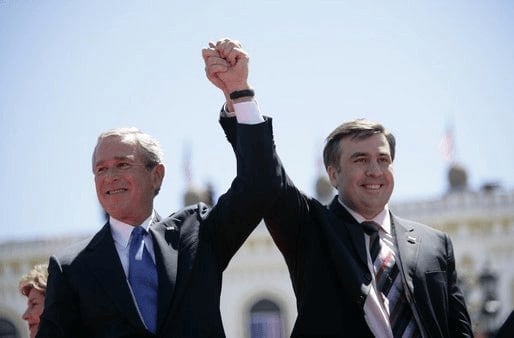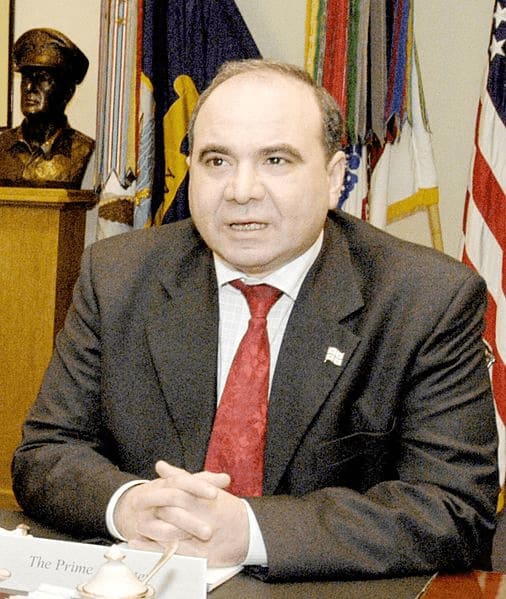Revolutions are always exciting times for U.S. Foreign Service personnel, and the November 2003 Rose Revolution in Georgia was no different. Denny Robertson served as a USAID (United States Agency for International Development) election observer. When President Shevardnadze’s government allegedly rigged a parliamentary election, Robertson saw first-hand how Georgians took to the streets and protested in mass. Active resistance from two of Georgia’s political parties even prevented Shevardnadze from opening the Georgian Parliament. Stymied by the opposition and loss of political support, Shevardnadze resigned. Georgia immediately held a presidential election, and Mikheil Saakashvili, leader of one of the major opposition parties, emerged victorious.
USAID personnel such as Denny Robertson played an important role in Georgia. As election monitors, they witnessed the blatant fraud that Shevardnadze’s government perpetrated. Later, they also advised the newly elected government under Saakashvili and provided aid to the Georgian people.
Denny Robertson, who had a varied career at USAID, was present for the entire Rose Revolution and its aftermath. In addition to being USAID Mission Director in the Caucasus and Romania, he was an Education Officer in South Africa and a Project Development Officer in Mongolia and Thailand.
Denny Robertson’s Interview was conducted by Mark Tauber on July 9, 2018.
Read Denny Robertson’s full interview HERE.
Drafted by Alex Firestone
Excerpts:
“I witnessed the most egregious and transparent election fraud that I’ve ever seen in my entire life.”
Blatant Rigging of an Election: Prior to the Rose Revolution, most of our assistance was only modestly effective at best. Post-Rose Revolution, the Georgian government reconvened itself with 25-year-old ministers who had been to university in the United States, were fluent English speakers, and so this thin, thin, thin layer of the government was made of people everybody could talk to. They were exposed to many of the concepts of capitalism and democracy. It was a fascinating period. And Misha (Mikheil Saakashvili) was a force of nature.
Before I get to that, I think it’s important to say that one of the things that happened in those few months that I was there before the Rose Revolution was, I was an election monitor at the last failed election, which led to the Rose Revolution. I was in an election-monitoring group in Adjara, which was the region that was tightly controlled by a little tinpot dictator. We were doing what election monitors do. We were watching. There was nothing else but just watching. Naïve as I was, I just assumed that it was going to be kind of a waste of time, but I witnessed the most egregious and transparent election fraud that I’ve ever seen in my entire life. We went to a polling station for the vote count. Everybody was sort of doing the needful. They were opening the ballot box, and dumping the ballot box on the table. They were counting the ballots, and everyone was following the protocols. At a certain point one young (and skinny) gentleman walked out— presumably one of the vote counters—to go to the bathroom or whatever. It was winter. He came back in his black leather jacket, and he had grown in size two or three times. It was this bulging black leather jacket bursting at the seams. He sat down at the table, and then the lights went out for about a minute. The lights came back on, and suddenly there is a large pile of ‘new’ ballots strewn around the table—and he is skinny again. Of course, we couldn’t do anything more than observe. We remarked, “You’ve got to be kidding!” They said, “What do you mean?” It was such a blatant example of the type of election corruption seen with my own eyes. So, they counted and of course Shevardnadze won. It was no surprise, I guess, that people were fed up.
“You know, we have nothing. The coffers are bare. There is no money. We have nothing.”
A New Government in Georgia—Saakashvili and American Aid: Working under the new government, it was fast. It was action packed. Obviously, Saakashvili had lived and studied in the United States. He knew the United States very well. The prime minister, Zurab Zhvania, was the leader of the civil society movement in Georgia—incredible credentials, wonderful human being and a civil society leader. They did their best to staff ministries with people who understood reforms. We worked with them closely and did our best to support their efforts rather than imposing on them. They basically came to us, the State Department and USAID, once they had kind of gotten their sea legs and said, “You know, we have nothing. The coffers are bare. There is no money. We have nothing.” And I think it was probably largely true. The U.S. cobbled together money where we could, and came up with a package to kind of get people started. The best part of the experience to me was, we knew what needed to be done, but they knew what needed to be done, and they were the ones that set the priorities. They knew that energy was crucially important to attracting foreign investment, so we finally got serious about energy sector reform. They understood the importance of the banking system. It was a pleasure in that sense to be able to work with them. Saakashvili, to his credit, did a lot. And the United States, we were partner number one. Misha often told people that he had George Bush on his mobile phone speed dial.
“The ambassador in Azerbaijan was resentful of Georgia getting all the attention.”
The Death of Zurab Zhvania and USAID’s Relationship with Azerbaijan: During that time, the prime minister (Zurab Zhvania) mysteriously died. I was somewhat close to the prime minister, and was shocked, as was the entire country. Although married, he was known pretty widely to be gay, and the death had some sensitive rumors surrounding it which made it more difficult to address in the press. Yeah. Georgians are not without their intrigue by a long shot, in their clan mentality, in addition to just politics. Operating in such a small context. It’s a very small country, so you could almost know everybody. I think as I mentioned, when I arrived, we were more really focusing on Azerbaijan because we got more traction there. Well, once the Rose Revolution took place, Azerbaijan became the stepchild, and the ambassador in Azerbaijan was resentful of Georgia getting all the attention. We still ran a pretty robust program there, but it was so obvious that you were dealing with a Georgian government that was doing its best to work honorably as partners, and an Azeri government that was just corrupt beyond anything you could imagine. It was very difficult to make even small dents in the reform agenda in Azerbaijan, where we actually made big progress in Georgia.
TABLE OF CONTENTS HIGHLIGHTS
Education
BS in Natural Resources Development, University of Michigan 1973–1977
Peace Corps 1977–1979
MS in International Resource Development, Michigan State University 1979–1981
Entered U.S. Agency for International Development 1983
Pretoria, South Africa —Education Officer, USAID 1987–1990
Mongolia—Project Development Officer, Asia Bureau, USAID 1991
Bangkok, Thailand—Project Development Officer, USAID 1992–1996
Washington, D.C.— Europe and Eurasian Bureau, USAID 1996–1999
Bucharest, Romania—Mission Director, USAID 1999–2003
Tbilisi, Georgia—Mission Director, USAID, Caucasus 2003–2006


